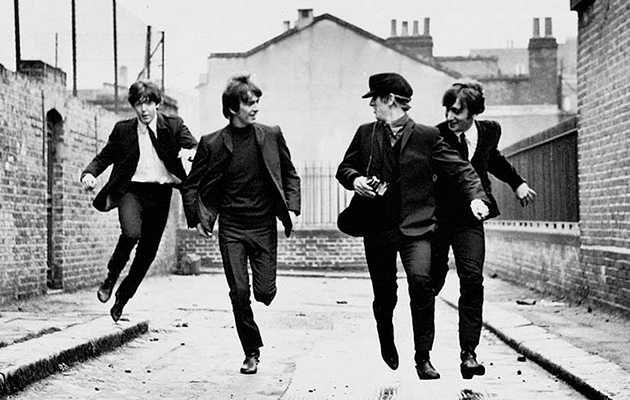
(My new American Thinker post)
It was August 1964, and our family was waiting in Jamaica for our "papers" to fly to the U.S. Over in downtown Kingston, I saw a big sign about a new movie by The oBeatles. My father did not know who the group was, and we kept walking, doing our errands.
Why didn't my father know who the band was? We had just left Cuba, and we never got them in the island. Think about it. The world was full of "Beatlemania," and all we heard was Fidel Castro's speeches. Do you understand now why I'm so grateful to my parents for getting us out of that communist island?
Later I learned that The Beatles were suddenly screen stars as well as the top band in the world! The movie, A Hard Day's Night, was released in the U.K. in July and in the U.S. in August. We heard all about their music when we finally landed in the U.S.
As someone said, the movie didn't have much of a plot, but lots of people paid to see it. The theaters were full from coast to coast.
The plot was sort of like a day in the life of the group. We saw The Beatles running around from concerts to studios to interviews, and there was one funny old man (Wilfrid Brambell) playing Paul's grandfather.
In retrospect, the movie was very funny. It was full of crazy comedy and some great dialogue that sounds better with age:
In Richard Lester's kinetic and influential, cinema verite music-video documentary about Beatlemania — the first Beatle film about a "day in the life":
the opening montage scene of the Beatles being besieged by a stampede of frenzied schoolgirl fans on their travels from their hometown of Liverpool to London to perform in a TV broadcast, and their retreat to a train station
Paul's meeting and encounter with an unimpressed, middle-aged gentleman (his fictional "Grandfather" John McCartney) (Wilfred Brambell), who was on their London-bound train in the first-class cabin; Paul told John: "He's very clean" (an oft-repeated line) and described him as "a villain, a real mixer"
the scene in the train compartment when proper, commuting city business-man Johnson (Richard Vernon) complained about their loud radio — with John's coo-ed line to him as he leaned over: "Give us a kiss!"; Johnson asserted: "I fought the war for your sort" — John impudently joked back: "I'll bet you're sorry you won"
the group's dry, dismissive one-liners when interviewed by the press with nonsensical questions:
John Lennon's answer about how he found America: ("Turned left at Greenland");
Ringo's answers to questions: "Are you a mod or a rocker?" "Uh, no, I'm a mocker"; and "What do you call that collar?" "A collar";
and George's answers: "Has success changed your life?" "Yes" and "What would you call that hairstyle you're wearing?" "Arthur"
Ringo's solitary misadventures, and "walkabout" wanderings around London as he snapped pictures — into a clothing store, strolling alongside a canal, in a pub; and along the way, the comic scene of Ringo offering his coat to cover muddy puddles for a lady to cross over, only to discover that the third puddle was a deep hole; he was apprehended by police for "wandering abroad, malicious intent, acting in a suspicious manner, conduct liable to cause a breach of the peace — you name it, he's done it"
I liked it, and I continue to like it a lot! Maybe life was simpler, or grandfather jokes appeal to me now that I have three of those little ones called grandchildren.
The soundtrack was great, such as the title song "A Hard Day's Night," also released as a 45 with "I Should Have Known Better" as the B-side. There were two great ballads: "And I Love Her" plus the beautiful "If I Fell."
We remember that there were two L.P.s issued, one for the U.S. and the other for the U.K. The U.S. version had several George Martin instrumentals, such as "This Boy: Ringo's Theme." As I heard in a George Martin interview, they issued two L.P.s for contractual reasons.
It was really a fun movie and a recess from all the mad stuff on the news. Catch it, and I'm sure you'll like it. We'll have plenty of time next week to talk about everything else.